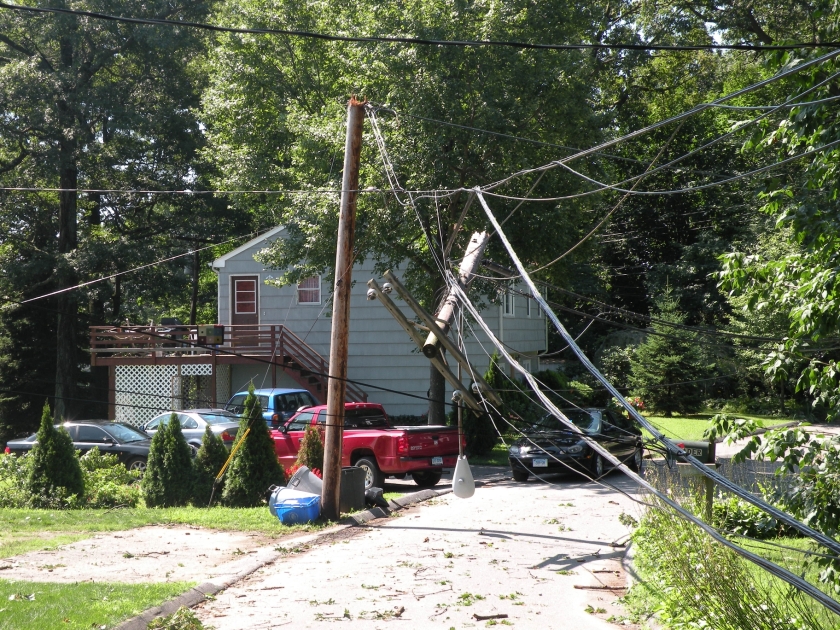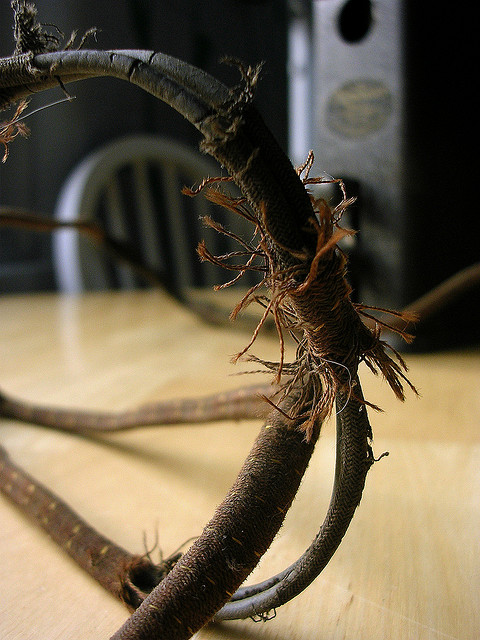
Concussion changes the brain. The changes can be temporary, or they can be permanent, but something changes inside your skull when you’re concussed.
First, the injury floods it with chemicals that aren’t supposed to be where they go. And sometimes those chemicals can actually damage healthy cells.
The connections that used to get information from one place to the next can be altered.
Depending on the type of concussion, there can be bleeding, twisting, or shearing of connections, that make it harder for information to get where it needs to go.
Concussion is like a storm microburst that suddenly appears in a normally quiet neighborhood, blowing out windows, uprooting shrubbery and trees, pulling down power and cable lines, tossing lawn furniture into the street, and seriously rearranging the garbage cans that were neatly lined along the driveway. Even a quick hit or a “ding” can do some damage.

Clearing out the gunk that gets loose in your brain is a lot like clearing the wreckage after a microburst. First you have to pick up all the loose trash, then you have cut apart the trees that pulled down the power lines. Only after you get the big trees out and stand up the poles, can you tell if the electricity and phone lines are still any good.
Maybe some of them are fine.
Maybe others got pulled out of their connections, and utility crews need to just tighten them up.
And maybe some of the wires got so frayed and torn that they need to be replaced. That replacement takes time. New crews need to be called in. Maybe a crew isn’t available, or they don’t have the needed parts. The neighborhood is going to be out of power and cable for a bit.
That’s basically how it is after a concussion / mild TBI. Sometimes that proverbial microburst does damage to the actual connections in your brain.
And if you’ve had a prior concussion (or two or three – or nine, like me), your brain can have an even harder time getting information from one place to the next.
Imagine a neighborhood that’s had a lot of storms that knocked out power. Utilities crews have patched up the connections many, many times – and each time the connection gets a little easier to damage, because all the loosening and tightening and adjusting puts a strain on the materials used. Screws get stripped. Casings on cables get thin. Wires get twisted and re-twisted, weakening them in the process. Connectors get overloaded with additional cables. And while the system does restart, with each new storm, the power goes out that much more easily.
That’s pretty much what it’s like with repeat concussions.
Connections in the brain aren’t the only thing that can suffer after getting your bell rung.
When the information crosses the wires and actually gets where it’s going, the “microprocessors” that used to figure out what to do with it may have altered.
Our brains are incredibly complex, and they process billions upon billions of pieces of data on a moment-by-moment basis. When our neurochemical process is messed up, it can make it harder to figure out what to do with the information that comes through over our stressed “wiring”.
Let’s go back to that neighborhood that got hit by the microburst.
When the utility crews finally have the electricity back on, and cable is restored, can life go back to normal immediately?
Not if everyone in the neighborhood is exhausted from the cleanup. Even if you do have electricity and cable, surfing the channels is going to be a challenge. Who has the energy for it? You’re too wiped out from all the hauling and cutting and cleanup efforts. You may have your cable back, but when you use the remote, you fingers will hit the wrong buttons and you might have trouble reading the listings on your t.v. screen. If you’re getting on Facebook, you might have trouble typing or understanding what others have posted, because you’re so tired.
Even though you have electricity and cable, you still have trouble using them.
And that’s how it can be in your brain after concussion. Even if the information is getting through from synapse to synapse, once it gets there, the synapses may not know how to handle the info correctly.

As a result, your noggin isn’t processing things the way it used to.
It can feel a lot sssssllllllllooooooowwwwwerrrrrrrr.
You can feel like life is moving in slow motion.
And in a way, it is. Because the thing that observes and interprets your life is not firing on all cylinders. Not yet, anyway.
You can feel like you’re walking around in a fog. And you are. Remember the “gunk” that got released in your brain? It takes a while to clear it out, and in the meantime, your brain is struggling to connect the dots in your daily life – with connections that don’t work like they used to.

I am grateful to you for this blog. I appreciate your assiduous research and humanizing comments. I am a multiple TBI survivor, and I thank you.
LikeLiked by 1 person
Ah, thank you so much for your kind words. That’s a great way for me to start the day! I hope you have a good one.
LikeLike
Love this analogy – so perfect!
LikeLiked by 1 person
Thanks 🙂
LikeLike
Reblogged this on Broken Brain – Brilliant Mind and commented:
I wrote this a year ago. It’s still every bit as true today.
LikeLike